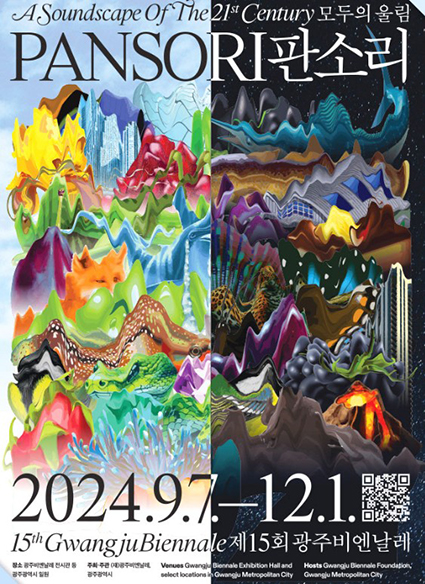Introducing the 2024 Gwangju Biennale
Pansori, a Soundscape of the 21st Century
By Kang Hyunsuk “Jennis”
The 15th Gwangju Biennale, opening in September, will feature thirty one unique pavilions, including contemporary art exhibitions across cultural venues in the city of Gwangju. The highly anticipated event will take place for 86 days, from September 7 to December 1.
Established in 1994 to commemorate the May 18 Gwangju Democratization Movement and the 50-year anniversary of Korea’s liberation, the Gwangju Biennale is now one of the leading art biennales in Asia. The Biennale fosters international cultural exchange and discourse on contemporary art, embodying the “Gwangju Spirit,” which encompasses the principles of revolution, democracy, and community. Over the past three decades, the Gwangju Biennale has challenged Western-centric art narratives, celebrated cultural diversity, and tackled global issues, such as climate change, race, gender, and democracy.
Celebrating its 30th anniversary this year, the Biennale’s pavilions will unfold across a variety of locations in Gwangju, including art museums, galleries, cultural institutions, and everyday venues frequented by local residents, as well as sites associated with Gwangju’s history, such as the May 18 Archives and the May 18 Memorial Culture Center. The Biennale provides a platform for domestic and international art and cultural institutions to connect, exchange ideas, and curate exhibitions and performances that reflect the global contemporary art scene.
For 30 years, the Gwangju Biennale has been a beacon of diversity and complexity. Having grown from a local city event to an influential sensation across Korea, Asia, and the global community, it aims to continuously introduce innovative themes that enrich discourse around civilization.
The Gwangju Biennale has tackled global issues such as climate change, race, gender, and democracy, striving to reshape the future of humanity from a planetary perspective and crossing geographical boundaries. Extending beyond a chronological recounting of the Gwangju Biennale’s history, the curatorial vision of the exhibition aims to reaffirm the Biennale’s contemporary relevance by delving into the essence of the “Gwangju Spirit.”

Artistic Director Nicolas Bourriaud titled the 15th Gwangju Biennale “Pansori, a Soundscape of the 21st Century.” Pansori is a form of music originating from southwestern Korea in the 17th century. The meaning of the name itself is “the sound of the public place,” or in other words, “the voice of the common people.” The Biennale aims to build a narrative on the spaces we live in, in the same way as pansori singers practice storytelling with an epic lyrical style, accompanied by drumming in which different beats are related to specific regions of Korea.
Proposing a journey into contemporary space, the Biennale will gather artists whose works reflect our new spatial conditions and the upheavals of the Anthropocene. To draw a topology of our times, the exhibition will take an operatic shape, structured by musical metaphors. “Pansori, a Soundscape of the 21st Century” presents itself as a visual symphony composed by international artists.
Compared to past renditions, the 2024 Gwangju Biennale’s scale and number of participating institutions has steadily grown. The 15th Biennale’s pavilions will be spread throughout Gwangju, including areas such as Yangnim-dong and Dongmyeong-dong. It is hoped that many Gwangju residents and out-of-town visitors will enjoy the soundscape of the Gwangju Biennale.
The Biennale Main Exhibitions
Gwangju Biennale Exhibition Hall, Yangnim Culture Center, Podonamu Art Space, Han Boo Chul Gallery, Han Hee Won Museun of Art, Yangnim Salon, Yangnim Old Police Station, Empty House, and Horanggasinamu Art Polygon
These are the venues of the pavilions of this year’s Gwangju Biennale with visiting times (in parentheses are the exhibiting countries and/or associations).
The Biennale Pavilions
- Africa: Gwangju Arts Center Annex Building
Open 10:00–18:00, except Mondays and
holidays - Argentina: The 5.18 Archives
Open 10:00–18:00, except Mondays and
holidays - Austria: Leekangha Art Museum
Open 10:00–18:00, except Mondays and
holidays - Canada: Yangrim Gallery
Open 10:00–18:00, except Mondays and
holidays - CDA Holon: Miro Center
Open 10:00–18:00, except Mondays and
holidays
6.China: Geumbong Museum
Open 10:00–18:00, except Mondays and
holidays - Denmark: Seeum
Open 10:00–18:00, except Mondays - Germany: Gwangju History and Folk Museum
Open 10:00–18:00, except Mondays and
holidays - Finland [British Council–Korea Foundation]:
Ha Jung-woong Museum of Art
Open 10:00–18:00, except Mondays and
holidays - Italy: Dong-gok Art Museum
Open 10:00–18:00, except Mondays and
holidays - Japan: Gallery of Laam
Open 10:00–18:00, except Mondays and holidays - Japan: Gallery Hyeyum
Open 10:00–18:00, except Mondays and
holidays - Malaysia, Myanmar, Philippines, Singapore,
Thailand, Vietnam [ASEAN-Korea Center];
Indonesia [Korea Foundation–Gwangju Biennale
Foundation]: Asia Culture Center, Creation
Spaces 5 and 6
Open 10:00–18:00 (Tue., Thu., Fri., Sun.),
10:00–20:00 (Wed., Sat.) - New Zealand: Suha Gallery
Open 10:00–18:00, except Mondays - Peru: Kimnetgwa
Closed on Mondays and holidays - Poland: Leeleenam Studio
Open 11:00–19:00 (weekdays),
10:00–19:00 (weekends) - Spanish Art: Yangnim Penguin Village Craft Street
Open 10:00–18:00, except Mondays and
holidays - Sweden: Chungjang22
Open 10:00–18:00 except Mondays - Union: Eunam Museum of Art
Open 10:00–17:00 except Sundays and holidays - The Netherlands: Gwangju Museum of Art
Open 10:00–18:00, except Mondays and
holidays - United States: May 18 Memorial Culture Center
Open 10:00–18:00 except Mondays - Qatar: Kwangju Bank Art Hall
Visitors can purchase tickets at a discounted rate during the advanced booking period, available until September 6. For more details on the Gwangju Biennale, visit https://gwangjubiennale.org/en/exhibition/biennale/pavilion.do




